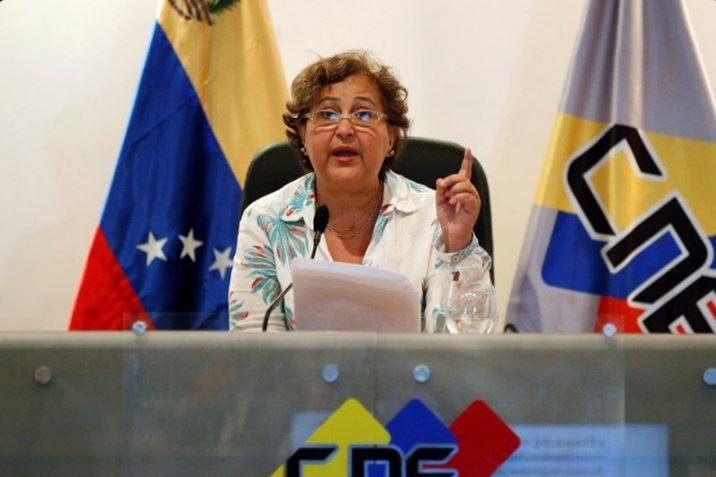Tibisay Lucena, president of Venezuela's National Electoral Council, or CNE, on Thursday postponed efforts to hold a recall referendum to remove President Nicolas Maduro from power over fraud allegations -- a ruling sharply condemned by the Democratic Unity Roundtable opposition. Photo courtesy of CNE
CARACAS, Venezuela, Oct. 21 (UPI) -- Venezuela's National Electoral Council, or CNE, postponed efforts to hold a recall referendum to remove President Nicolas Maduro from power over fraud allegations -- a ruling sharply condemned by the opposition.
The CNE previously allowed the Democratic Unity Roundtable, or MUD, opposition coalition to hold a three-day nationwide petition drive starting Wednesday. The opposition's efforts have been repeatedly hindered by Venezuela's institutions that are accused of making decisions favoring Maduro's regime.
After regional courts in the states of Aragua, Carabobo, Bolivar, Apure and Monagas annulled the results of the MUD's first signature-collection efforts held earlier this year -- citing fraud -- the CNE on Thursday postponed the second and final signature-collection effort in which the opposition needed to collect signatures from 20 percent of voters from each of Venezuela's 23 states.
"These decisions have resulted in the paralysis, until a new court order, in the process of collecting 20 percent of the votes, which was scheduled for Oct. 26, 27 and 28," the CNE said in its ruling.
Venezuela's highest court, the Supreme Tribunal of Justice, earlier this week made the opposition's efforts more difficult by ruling that instead of 20 percent of Venezuela's overall electorate, the MUD needed to collect 20 percent of signatures from each state -- including states with rural populations where support for Maduro's socialist regime is strongest.
The CNE's latest ruling likely defeats the opposition's efforts to remove Maduro before Jan. 10. The opposition hoped to hold the recall referendum in which citizens would be asked whether Maduro should be removed from office by Jan. 10. If held prior to that date, new elections would be triggered. If he is removed after that date, Maduro's vice president would assume the presidency until the end of Maduro's term in early 2019.
Venezuela's next presidential elections are scheduled for late 2018. The South American country is facing a political and economic crisis where basic goods such as food and medicine are in short supply, unavailable or unaffordable. The United Nation's Economic Commission for Latin America and the Caribbean predicts Venezuela's gross domestic product will decrease 4 percent in 2017.
The opposition further accused the CNE of favoring Maduro through unconstitutional methods after its ruling.
"A democratic government consults the people. A dictatorship flees to electoral councils. They kill recall referendum because narco-corrupt government is a dictatorship," Henry Ramos Allup, leader of the opposition-controlled National Assembly unicameral legislature, said in a statement. "There is simply no rule of law. This dictatorship is the product of a continued coup d'etat."
"Decision of the CNE who postponed 'until further notice' the collection of 20 percent reiterates the weakness of the regime," MUD leader Jesus "Chuo" Torrealba said in a statement. "Can the regime 'postpone' the inflation? Can you 'postpone' the hunger? Can you 'postpone' their corruption? No! You also can't postpone change!"















